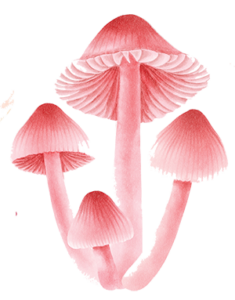 Different edible mushrooms may play a role in the prevention1 and treatment2,3 of dementia by reducing or inhibiting the production of β-amyloid and phosphorylated tau.4 One study in which patients with mild Alzheimer’s disease were administered either erinacine A–enriched lion’s mane capsules or placebo demonstrated a significant reduction in the Cognitive Abilities Screening Instrument scores in the placebo group, a significant improvement in the Mini-mental State Examination scores in the lion’s mane group, and a significant difference in Instrumental Activities of Daily Living scores between the two group after 49 weeks of treatment.2 In mice, tests performed to evaluate memory and learning function suggested that lion’s mane supplementation prevented the impairments of spatial short-term and visual recognition memory induced by amyloid β25–35 peptide.5
Different edible mushrooms may play a role in the prevention1 and treatment2,3 of dementia by reducing or inhibiting the production of β-amyloid and phosphorylated tau.4 One study in which patients with mild Alzheimer’s disease were administered either erinacine A–enriched lion’s mane capsules or placebo demonstrated a significant reduction in the Cognitive Abilities Screening Instrument scores in the placebo group, a significant improvement in the Mini-mental State Examination scores in the lion’s mane group, and a significant difference in Instrumental Activities of Daily Living scores between the two group after 49 weeks of treatment.2 In mice, tests performed to evaluate memory and learning function suggested that lion’s mane supplementation prevented the impairments of spatial short-term and visual recognition memory induced by amyloid β25–35 peptide.5
Lion’s mane consumption may also benefit patients with depression and anxiety: in a study of 30 women, those who consumed lion’s mane cookies for four weeks had reduced scores on the Center for Epidemiologic Studies Depression Scale and Indefinite Complaints Index, compared to those who consumed placebo cookies.6 Separately, treatment with psilocybin, a naturally occurring psychedelic substance present in Psilocybe mushrooms, combined with psychedelic psychotherapy, relieved major depressive disorder symptoms in adult patients for up to one year,7 and a systematic review and meta-analysis determined that psilocybin was more effective than placebo in treating state (threat-specific) anxiety for up to two weeks and trait (general) anxiety up to six months after treatment.8
Sources
1. Li I-C, Chang H-H, Lin C-H, et al. Prevention of early Alzheimer’s disease by erinacine A–enriched Hericium erinaceus mycelia pilot double-blind placebo-controlled study. Front Aging Neurosci. 2020;12:155.
2. Yanshree, Yu WS, Fung ML, Lee CW, Lim LW, Wong KH. The monkey head mushroom and memory enhancement in Alzheimer’s disease. Cells. 2022;11(15):2284.
3. Phan CW, David P, Naidu M, Wong K-H, Sabaratnam V. Therapeutic potential of culinary-medicinal mushrooms for the management of neurodegenerative diseases: diversity, metabolite, and mechanism. Crit Rev Biotechnol. 2015;35(3):355¬368.
4. Feng L, Cheah IK-M, Ng MM-X, et al. The association between mushroom consumption and mild cognitive impairment: a community-based cross-sectional study in Singapore. J Alzheimer’s Dis. 2019;68(1):197–203.
5. Mori K, Obara Y, Moriya T, Inatomi S, Nakahata N. Effects of Hericium erinaceus on amyloid β(25-35) peptide-induced learning and memory deficits in mice. Biomed Res. 2011;32(1):67–72.
6. Nagano M, Shimizu K, Kondo R, et al. Reduction of depression and anxiety by 4 weeks Hericium erinaceus intake. Biomed Res. 2010;31(4):231–237.
7. Gukasyan N, Davis AK, Barrett FS. Efficacy and safety of psilocybin-assisted treatment for major depressive disorder: prospective 12-month follow-up. J Psychopharmacol. 2022;36(2).
8. Yu C-L, Yang F-C, Yang S-N, et al. Psilocybin for end-of-life anxiety symptoms: a systematic review and meta-analysis. Psychiatry Investig. 2021;18(10):958–967.





